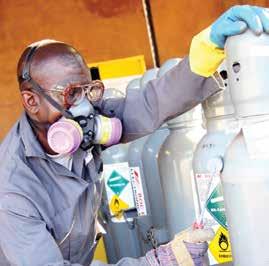
3 minute read
Commodity chemicals
Stable volatility
South Africa is no slouch when it comes to chemicals manufacturing, writes James Francis
Contributing 14 per cent of GDP, manufacturing is South Africa’s fourth-largest sector. Chemical manufacturing is the third-biggest segment in that pool and quite diversified: commodity chemicals account for 64 per cent of the market, a quarter going to a wide variety of chemicals-use cases and 11 per cent to agriculture, according to InvestSA.
As a pillar of the economy, the sector has thankfully been able to absorb some of the knocks of the COVID-19 pandemic, says Pelchem managing director, Ivan Radebe. “There has been reduced demand from the export markets as the global manufacturing sectors halted operations. To mitigate against financial loss and to respond to government’s call to ensure the country has adequate resources to fight against the COVID-19 pandemic, Pelchem began production and sale of WHOrecommended sanitisers at our Pelindaba operations.”
GROWTH POTENTIAL
In some respects, South Africa is a potent global player with more potential in the wings, exporting to Asian, European and African
The state OF plastic bags
South Africans use more than two billion plastic bags every year. According to Plastics SA, around 46.3 per cent of local plastics enter a recycling process, though the rate of single-use shopping bags might be below 4 per cent. Yet even if half of all plastics are recycled, that’s not overwhelming enough to be effective, and more recent concerns about microplastics polluting the world have raised the stakes to replace plastic bags with long-term alternatives.
Three choices are available: reusable; biodegradable and compostable plastic. The latter two often conflated, although compostable plastics don’t produce microplastics, says Bonnie Biodegradables CEO Frank McDouall. The term “biodegradable” is also often misused for greenwashing. “Reusable and recycled plastic bags are great,” says Annabé Pretorius, plastics consultant at Plastix 911, “but they often can’t be recycled a second time.”
CHOICES AND CHALLENGES
The motivation to adopt better plastics is often a moral one. In terms of costs, virgin plastic bags are cheaper by a factor of two or more. Yet if broken down to a per-unit price (say the Saran wrap on meat) it’s a marginal cost. Nonetheless, virgin plastic is cheaper and the tipping point lies with consumer behaviour. Hopefully threats such as microplastics – of which we may consume 5g (or a credit card’s worth) a week, according to the WWF – will motivate change away from conventional petroleum-based plastics to plant-based or nonsynthesised ones.
All choices pose challenges: virgin plastic derives from oil, recycled plastic can’t be recycled perpetually (and there is growing consensus that recycling is ineffective at reducing plastics pollution), mislabelled biodegradable plastics are increasing microplastic volumes, and the cultivation of materials for compostable plastics is still maturing and evolving. It is possible to live in harmony with plastic bags, but this will require new behaviours from consumers and proactive investments from companies. markets. Other than our coal reserves boosting plastic manufacturing, the country is also home to the world’s largest fluorspar deposits. But it hasn’t been smooth sailing. According to the Chemical & Allied Industries’ Association (CAIA), the sector’s growth is lower than global levels for a variety of reasons, including cheap imports and not enough downstream beneficiation, meaning the value chain should be deepened in the country.
Pre-COVID-19, the chemicals sector nonetheless expected to double its size over the next few years. That growth might now be delayed, yet the fact that it is Africa’s most advanced chemicals sector and at least four times larger than that of either Nigeria or Egypt adds to the sector’s resiliency. “There are opportunities to grow into Africa in the short- and long-term,” Radebe adds. Such opportunities will be necessary, as the industry has been disproportionately affected because of its role in mining and other
Ivan manufacturing supply
Radebe chains impacted by the pandemic.
fast fact The local chemical manufacturing market is valued at around r361.4-billion. it contributes 3.4 per cent to GDP and is the third-largest manufacturing sector, exporting around r67-billion of goods annually. Source: CAIA, InvestSA
SIZE AND VALUE OF THE GLOBAL MARKET
The global plastic industry produces around 300 million tonnes of plastic annually and is worth R20-trillion, growing three per cent year on year. Around one trillion single-use plastic bags are used annually, though the largest polluters of microplastics (smaller than 5mm and often invisible to the naked eye) are car tyres and clothing fibres.
Source: UN Environment, The Business Research Company, European Parliament








